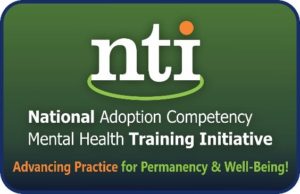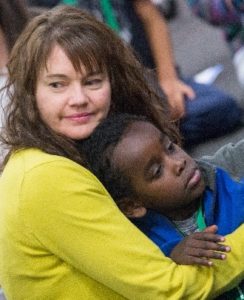Filling in the Identity Blanks: Identity Development Complexity in Adoption
Who Am I?
This timeless question has added complexity for individuals connected to adoption. Particularly for adopted individuals, being able to integrate their birth family experience with their adoptive family experience is necessary for forming a cohesive self. This includes being able to integrate elements of birth culture with culture of experience, which is frequently different. Many adoptees need extra support as they navigate the uniquely complex journey of figuring out who they are and their place in the world. Mental Health professionals who have an accurate understanding of adoption along with training about adoption and related issues are best able to serve this population.
Integrating the Various Parts of Self
Adoption research often describes self-identity as being derived from a combination of our own internal appraisal and messages from others. The different aspects of self can include our physical self, psychological self, our social self, and our self-esteem which is how we judge ourselves. Integrating the various parts of “self” into a cohesive whole is how we form our identity. Watch the video, “Adoption and Identity Intertwined” by Mei Kelly. This video interviews many adoptees who share about the importance and challenges of identity.
We all go through developmental stages, particularly as teens, where we try on a lot of different hats before we figure out who we uniquely are. Many adopted people struggle to figure out who they are because they often don’t have a lot of knowledge or information about their own history. It’s hard to know where you’re going if you don’t know where you’ve been! Supporting adoptees learning all they can about themselves and honoring their right to own their own history is critical in working with adoptive families on identity related issues.
Filling in the Blanks
Helping families create openness with their child is essential in supporting the child or youth in their identity development. Families may have a hard time talking about issues related to their child’s birth family. This history may be filled with difficult information or parents may not have the information, so they hesitate to start conversations.
It’s important for parents and professionals to remember that just because youth are not bringing up feelings or questions related to adoption, it doesn’t mean they aren’t thinking about it. Particularly during the adolescent years when identity is central, youth are eager for information to fill in the blanks.
 Experts behind NTI Training (National Adoption Competency Mental Health Training Initiative) recommend that parents always be honest with youth about their histories, even if difficult information is a part of their past experiences. Sharing information in realistic, honest and age appropriate ways is vital. Experts also recommend sharing information before adolescence because of the tumult that often accompanies the teen years (and that tumult goes for all teens, not just ones who were adopted!).
Experts behind NTI Training (National Adoption Competency Mental Health Training Initiative) recommend that parents always be honest with youth about their histories, even if difficult information is a part of their past experiences. Sharing information in realistic, honest and age appropriate ways is vital. Experts also recommend sharing information before adolescence because of the tumult that often accompanies the teen years (and that tumult goes for all teens, not just ones who were adopted!).
 As the adoption conversation unfolds, this is a key time for parents to reach out for adoption competent supports, particularly if there is challenging or missing information from the past. These supports can help navigate these conversations in an effective way. Adoption competent therapists at The Center for Adoption Support and Education may be a valuable resource. Learn more.
As the adoption conversation unfolds, this is a key time for parents to reach out for adoption competent supports, particularly if there is challenging or missing information from the past. These supports can help navigate these conversations in an effective way. Adoption competent therapists at The Center for Adoption Support and Education may be a valuable resource. Learn more.
Diversity, Ethnicity and Culture
 Children whose birth ethnicity and culture differs from their adoptive family’s may experience other significant challenges as they strive to develop an identity. Families should be regularly infusing the child’s birth culture into the family’s experience on a regular basis. Exposing children to role models that are ethnically and culturally similar and making sure the whole family has regular interactions with members of the child’s birth culture is critically important for a youth to experience a sense of integration in their lives. Parents should reach out for culturally appropriate supports in order to create authentic bridges between birth and adoptive family experiences.
Children whose birth ethnicity and culture differs from their adoptive family’s may experience other significant challenges as they strive to develop an identity. Families should be regularly infusing the child’s birth culture into the family’s experience on a regular basis. Exposing children to role models that are ethnically and culturally similar and making sure the whole family has regular interactions with members of the child’s birth culture is critically important for a youth to experience a sense of integration in their lives. Parents should reach out for culturally appropriate supports in order to create authentic bridges between birth and adoptive family experiences.
Providing Effective Support
Mental Health and Child Welfare professionals who receive adoption specific training are best suited to support youth and their families as they work through identity related challenges. NTI is a comprehensive training that provides professionals with both the knowledge and the tools to fully understand these nuances in adoptive families and create strategies that make sense based on the unique experiences of persons connected to adoption.
Go further:
- Learn more today about how NTI is advancing practice for permanency and well-being.
- Read the NTI article from the Rudd Adoption Research Series.
- Connect with an NTI Implementation Specialist to learn how to bring NTI Training to your organization.
NTI was funded through a cooperative agreement (#90CO1121) between the Children’s Bureau, Administration for Children and Families, US Department of Health and Human Services and the Center for Adoption Support and Education (C.A.S.E.). Explore the NTI website: www.adoptionsupport.org/nti.
NTI Authors: Kim Paglino, Lisa Maynard, Edna Davis-Brown and Dawn Wilson

